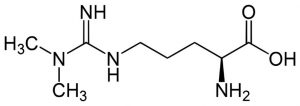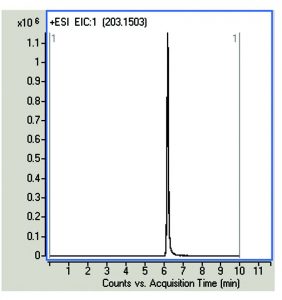LCMS Method with Plasma Samples
ADMA has a very narrow concentration distribution in the general population. For this reason, the method of analysis of this compound in body fluids (Plasma, Urine) should have a very high precision and accuracy to generate clinically useful results.
The analysis of ADMA in Plasma Samples shown in the figure is a simple and robust method that is suitable for the routine determination of this important biomarker. The correlation coefficient (r2) of the calibration curve created in the plasma matrix was 0.9998. The advantages over other published LCMS methods are the short equilibration time between runs, no need for derivatization of the sample, and good repeatability.

Peak:
6 overlaid injections on different days of ADMA (203.1503 m/z) in plasma sample.
Method Conditions
Column: Cogent Diamond Hydride™, 4μm, 100Å
Catalog No.: 70000-15P-2
Dimensions: 2.1 x 150mm
Mobile Phase:
—A: 50% DI Water / 50% 2-Propanol / 0.1% Formic Acid (v/v)
—B: Acetonitrile / 0.1% Formic Acid (v/v)
Gradient:
| Time (minutes) | %B |
| 0 | 90 |
| 5 | 30 |
| 8 | 30 |
| 10 | 90 |
Post Time: 3 minutes
Flow rate: 0.4 mL / minute
Detection: ESI – POS – Agilent 6210 MSD TOF Mass Spectrometer
Injection vol.: 1μL
Sample Preparation: Plasma Sample was spiked with stock solution of ADMA (1 mg / mL in DI Water) to a final concentration of 0.5 mmol / L The solution was filtered through a disposable 0.45µm Syringe Filter (MicroSolv Tech Corp.). Sample for injection was diluted 1:100 with 50:50 Solvent A:B mixture.
t0: 0.9 minutes
Note: Latest studies have demonstrated that ADMA is a marker for stroke and also it is a novel cardiovascular risk factor. Published reports [1,2] have documented a relation between high levels of ADMA and coronary heart disease, congestive heart failure, cerebral small vessel disease and ischemic stroke in young people.
[1.] Valkonen V.P., Paiva H, Salonen J.T., et al, Lancet 2001, 358, 2127-8.
[2.] Schulze F, Carter A.M., Schwedhelm E, et al, Atherosclerosis 2010, 208, 518-23.
Attachment
No 169 Asymmetric Dimethylarginine ADMA pdf 0.3 Mb Download File



